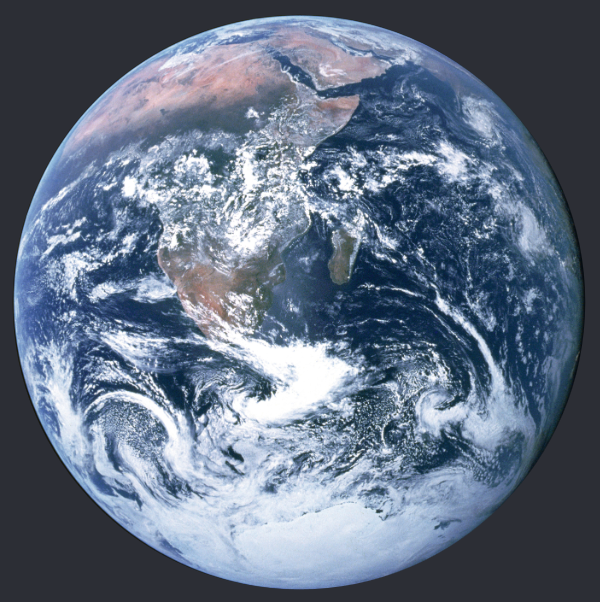English version:
Translated with www.DeepL.com/Translator (free version)
Overview Effect

Text from Johannes Wiek
Eugene Cernan was the last man on the moon. On December 19, 1972, as a member of a total of eleven crew members of the eleventh manned flight of the Apollo program, he left our terrestrial satellite. Not without describing his thoughts when looking at mankind’s home planet: “That’s humanity, love, feeling and thought. You don’t see the barriers of color or religion and politics that divide this world. You wonder, if you could get everyone in the world up here, wouldn’t they have a different feeling – a new perspective?”
„The thing that really surprised me was that [the Earth] projected an air of fragility. And why, I don’t know. I don’t know to this day. I had a feeling it’s tiny, it’s shiny, it’s beautiful, it’s home, and it’s fragile.“
Michael Collins, astronaut, Apollo 11 mission
Cernan was not alone in this shift in perspective. The journalist and space enthusiast Frank White had noticed that many astronauts reported a special experience and a far-reaching, in some cases dramatic change of consciousness after their return, which the view of our globe from space had triggered in them. He began collecting these impressions and in 1987 published the book that would coin a term that is increasingly relevant today:
“The Overview Effect.”
„It’s a perspective of the world that allows us, hopefully, to make better collective, global decisions about what’s happening – less jealous, narrow, local decisions. And we need that type of thinking if we’re truly going to have this many people and this standard of living for the foreseeable future.“
Chris Hadfield, commander of the International Space Station (ISS) in 2010
White has been spreading the word ever since. But for a long time, no one seemed to take it seriously. Even though many of the now nearly 550 people of numerous nationalities who have been able to see our Earth as a blue sphere from space – especially over long periods aboard the International Space Station (ISS) – confirm the sometimes dramatic effect it has had on their own view of the world. It is probably best described as a deeply felt sense of interconnectedness of all people and living beings. Combined with a strong instinctive urge to protect this fragile, living connection by all means. The statements of Apollo 14 astronaut Edgar Mitchell reflect this spontaneous protective instinct also towards those who put the well-being of humanity and the planet at risk or threaten it:
„You develop an instant global consciousness, a people orientation, an intense dissatisfaction with the state of the world, and a compulsion to do something about it. From out there on the moon, international politics look so petty. You want to grab a politician by the scruff of the neck and drag him a quarter of a million miles out and say, ‚Look at that, you son of a bitch!‘“
He may soon get his wish. Shortly before this issue went to press, Jeff Bezos, Amazon founder and one of the richest people in the world, announced that he himself wants to be aboard the first manned flight of the New Shepard. A rocket plane manufactured by his space company Blue Origin, which is scheduled to launch on July 20, 2021, and cross the so-called Kármán Line, which marks the boundary between Earth’s atmosphere and space, at an altitude of 100 kilometers for a short time. Four guests can also be on board. The first passenger seat was auctioned off in a very short time by an anonymous bid for 28 million dollars. Elon Musk also recently announced the launch of his much more spacious Starship passenger rocket in 2023.
„The Earth was small, light blue, and so touchingly alone, our home that must be defended like a holy relic.“
Alexei Leonov, cosmonaut, the first human to leave his spacecraft and float in space secured only by a tether
So here’s hoping that astronaut Edgar Mitchell’s wish comes true and the right people, who need the Overview Effect the most and should experience it for the good of all of us, invest in the trip. Otherwise, we could try to pool funds to help some people, if we can’t shoot them to the moon, to finance the trip to space.
!!!
Frank White: The Overview Effect – Space Exploration and Human Evolution. Reston (VA): Houghton-Mifflin 2014 (Erstauflage 1987)
Blue Marble is a famous photograph of Earth taken by Harrison Schmitt, a member of the Apollo 17 crew in 1972 from a distance of about 29,000 km. The Blue Marble image became very popular after its publication by numerous environmental movements and is considered to epitomize the vulnerability and uniqueness of Earth’s planet.
„If somebody’d said before the flight, ‚Are you going to get carried away looking at the Earth from the moon?‘ I would have said, ‚No, no way.‘ But yet, when I first looked back at the Earth, standing on the moon, I cried.“
Alan Shepard, astronaut, first American in space and fifth man on the moon
JOHANNES WIEK
Johannes Wiek, UW/H alumnus, is a journalist, strategic communications consultant and editorial director of WITTEN LAB Magazine.